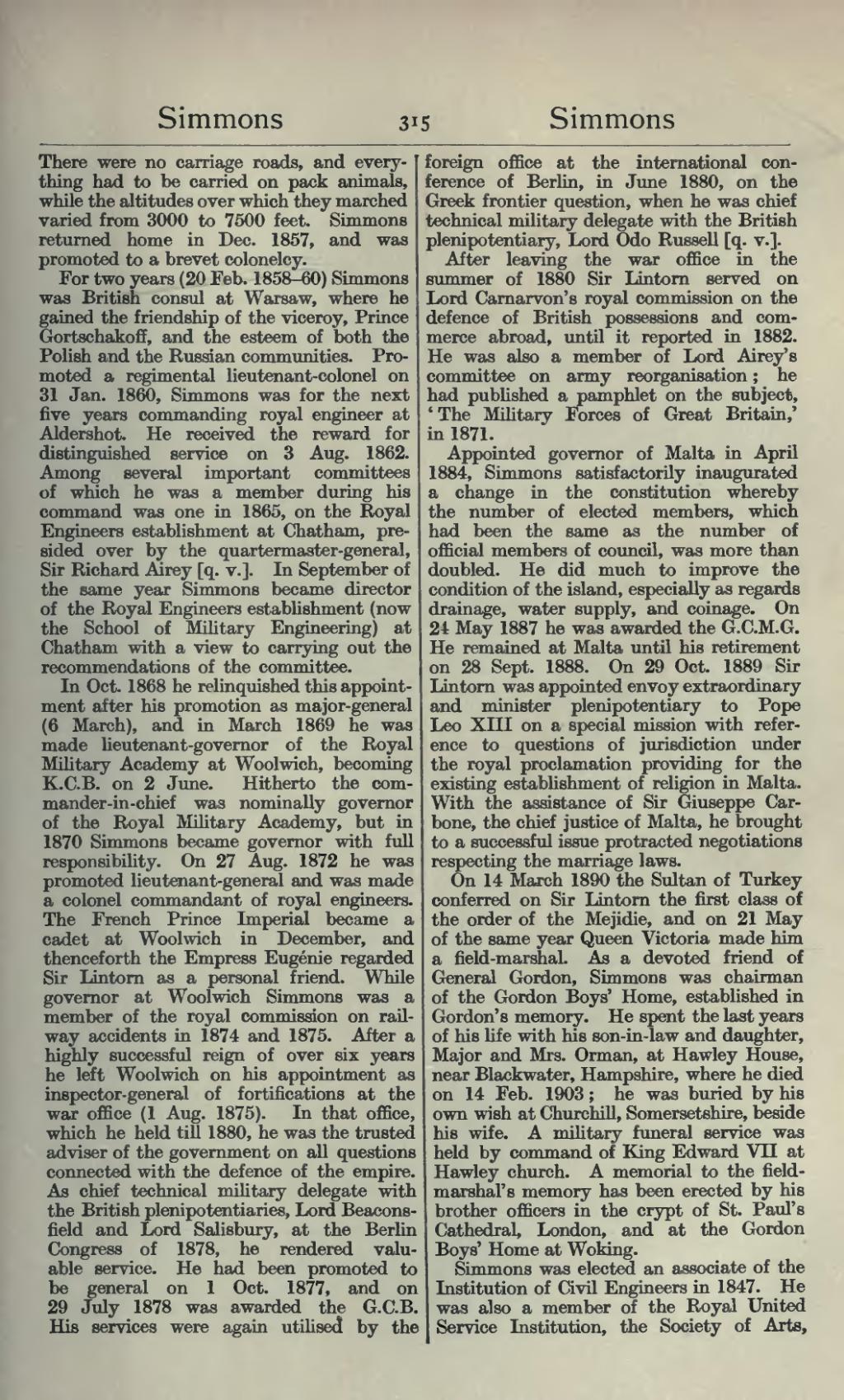There were no carriage roads, and everything had to be carried on pack animals, while the altitudes over which they marched varied from 3000 to 7500 feet. Simmons returned home in Dec. 1857, and was promoted to a brevet colonelcy.
For two years (20 Feb. 185&-60) Simmons was British consul at Warsaw, where he gained the friendship of the viceroy. Prince Gortschakoff, and the esteem of both the Polish and the Russian communities. Promoted a regimental lieutenant-colonel on 31 Jan. 1860, Simmons was for the next five years commanding royal engineer at Aldershot. He received the reward for distinguished service on 3 Aug. 1862. Among several important committees of which he was a member during his command was one in 1865, on the Royal Engineers establishment at Chatham, presided over by the quartermaster-general. Sir Richard Airey [q. v.]. In September of the same year Simmons became director of the Royal Engineers estabUshment (now the School of MUitary Engineering) at Chatham with a view to carrying out the recommendations of the committee.
In Oct. 1868 he relinquished this appointment after his promotion as major-general (6 March), and in March 1869 he was made lieutenant-governor of the Royal Military Academy at Woolwich, becoming K.C.B. on 2 June. Hitherto the commander-in-chief was nominally governor of the Royal Military Academy, but in 1870 Simmons became governor with full responsibility. On 27 Aug. 1872 he was promoted lieutenant-general and was made a colonel commandant of royal engineers. The French Prince Imperial became a cadet at Woolwich in December, and thenceforth the Empress Eugenie regarded Sir Lintom as a personal friend. While governor at Woolwich Simmons was a member of the royal commission on railway accidents in 1874 and 1875. After a highly successful reign of over six years he left Woolwich on his appointment as inspector-general of fortifications at the war office (1 Aug. 1875). In that office, which he held till 1880, he was the trusted adviser of the government on all questions connected with the defence of the empire. As chief technical military delegate with the British plenipotentiaries, Lord Beaconsfield and Lord Salisbury, at the Berlin Congress of 1878, he rendered valuable service. He had been promoted to be general on 1 Oct. 1877, and on 29 July 1878 was awarded the G.C.B. His services were again utilised by the foreign office at the international conference of Berlin, in June 1880, on the Greek frontier question, when he was chief technical military delegate with the British plenipotentiary. Lord Odo Russell [q. v.]. After leaving the war office in the summer of 1880 Sir Lintom served on Lord Carnarvon's royal commission on the defence of British possessions and commerce abroad, until it reported in 1882. He was also a member of Lord Airey's committee on army reorganisation ; he had published a pamphlet on the subject, 'The Military Forces of Great Britain,' in 1871.
Appointed governor of Malta in April 1884, Simmons satisfactorily inaugurated a change in the constitution whereby the number of elected members, which had been the same as the number of official members of council, was more than doubled. He did much to improve the condition of the island, especially as regards drainage, water supply, and coinage. On 24 May 1887 he was awarded the G.C.M.G. He remained at Malta until his retirement on 28 Sept. 1888. On 29 Oct. 1889 Sir Lintom was appointed envoy extraordinary and minister plenipotentiary to Pope Leo XIII on a special mission with reference to questions of jurisdiction under the royal proclamation providing for the existing establishment of religion in Malta. With the assistance of Sir Giuseppe Carbone, the chief justice of Malta, he brought to a successful issue protracted negotiations respecting the marriage laws.
On 14 March 1890 the Sultan of Turkey conferred on Sir Lintom the first class of the order of the Mejidie, and on 21 May of the same year Queen Victoria made him a field-marshal. As a devoted friend of General Gordon, Simmons was chairman of the Grordon Boys' Home, established in Gordon's memory. He spent the last years of his life with his son-in-law and daughter. Major and Mrs. Orman, at Hawley House, near Blackwater, Hampshire, where he died on 14 Feb. 1903 ; he was buried by his own wish at Churchill, Somersetshire, beside his wife. A mihtary funeral service was held by command of King Edward VII at Hawley chvirch. A memorial to the field-marshal's memory has been erected by his brother officers in the crypt of St. Paul's Cathedral, London, and at the Gordon Boys' Home at Woking.
Simmons was elected an associate of the Institution of Civil Engineers in 1847. He was also a member of the Royal United Service Institution, the Society of Arts,
